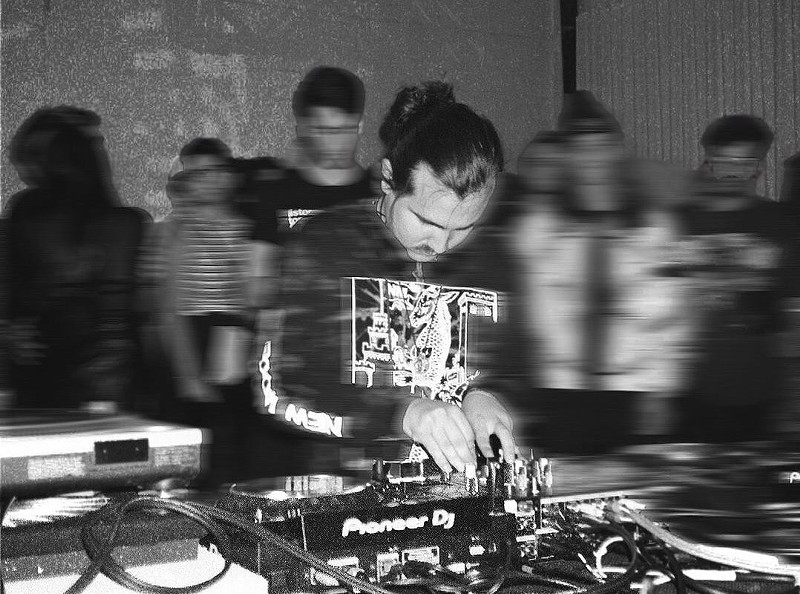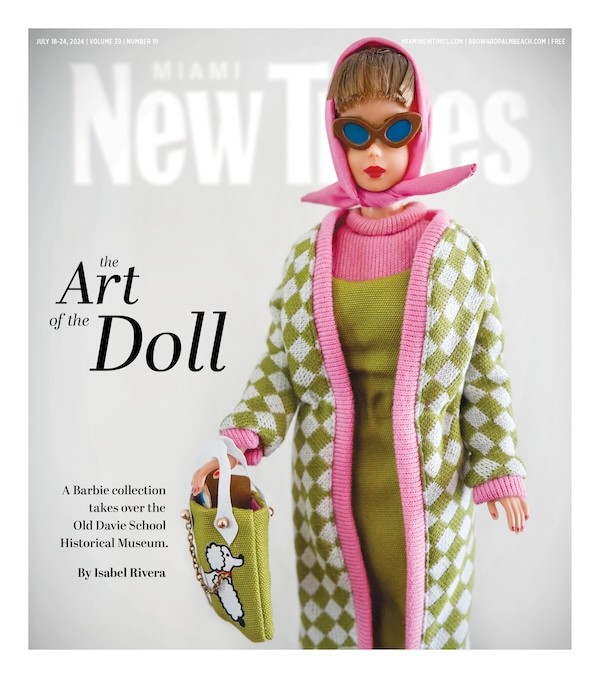“It was supposed to be a little more lighthearted — drum tracks for the club — but the anxiety usually finds its way in somehow," Nick León tells the New Times about the two-year-long journey of Aguacero, his latest album.
The 26-year-old produced a record that throws away the notion that electronic music is solely meant for a party. Aguacero can certainly make you move your feet; it is dementedly rhythmic, demonstrating the ferocity of climate change in a city with rising sea levels, record high temperatures, and an impending hurricane season.
León, who was born in California and moved to Miami with his parents at age three, has made serious movement in Miami’s underground for the past four years with his production, DJ sets, and reboot of Space Tapes, a genre-blending label that spotlights Miami producers.
“I think it deals with pushing the boundaries of club music,” León explains. “I have a hard time understanding people who don’t try different genres — at least now. It doesn’t make sense in 2020. We grew up listening to different genres on shuffle. So why wouldn’t our music reflect that? Space Tapes, at least in the beginning, was about highlighting Miami. Genres went out the window so more people can express themselves.”
Aguacero — the Spanish word for downpour — was released by Mexico City label N.A.A.F.I on June 5. Like León, N.A.A.F.I views experimental electronic music as a way to tap into its artists' heritage and act as a conduit to cultural awareness.
After catching the label's attention with his 2016's release, Amazonic, León met up with its manager, Tomás Davo, during Art Basel 2017 and again when León was invited to play a party in Mexico City.
“I’ve admired the label since I discovered them in 2015,” León says. “We’ve been trying to bridge the gap between Mexico City and Miami. It started to make sense, and I asked a mutual friend if it was a good idea to send them the project and they said, ‘Yeah.’ ”
Partly inspired by Afro-Cuban rhythms, Mexican guarachero, and Brazilian baile funk (AKA funk carioca), percussion, bird samples, and reverb make up the album's soundscape. Totaling seven tracks, Aguacero is linear in movement, with each track usurping its predecessor.
“Rayo,” the first cut, is a rich polyrhythm of drum patterns that send a twitch down the listener's spine with an eerie feeling that creeps around — like standing in a skyscraper built on sacred land.
“I think it goes back to just trying to channel the ancient,” León says. “I just like percussion — there’s movement in the tracks and it gets to the point. It’s a test to see how creative I can get with just percussion.”
Track 5, the catchy “Pelican Dub,” seems made for the dance floor. Fast and delirious, chaotic bongos sputter out of control as vocals provided by Uruguayan artist Lila Tirando a Violeta bounce around and pelicans squawk in the background.
“I was sitting on 'Pelican Dub' for a while. It was just a beat and didn’t think it was going to go anywhere. I sent it over to Lila and she came back with stems of pelican sounds and the vocals," León says, explaining that he'd met Lila through a mutual friend over the internet. "We both have features on each other's projects," he adds. "She was supposed to come [and perform in Miami] — but COVID."
The album's penultimate track, “Tormenta,” is nothing short of cataclysmic in its structure. Bass and drums intertwine together in a way that is suffocating.
Fortunately, Aguacero closes on a brighter note, as the fourth song, an industrial banger called “Grillo,” is revisited by N.A.A.F.I act Zutzut (AKA Alejandro Nuñez). In the remix, Zutzut manages to take the track out of its nihilism and into something ready for the dance floor.
“Zutzut is probably my favorite producer from N.A.A.F.I," León says. “We met in Mexico a couple of years ago. After I turned in the EP, [N.A.A.F.I] asked if I wanted anyone to do a remix, so I asked if [Nuñez] would be down. I’m super happy with it. I feel like the product is serious, but this one chills it out with a club sound.”
While electronic music has a stigma of being opaque sounds escaped from meaning, on Aguacero, León flips the assumption by bringing music that is poignant and nuanced.
“I feel like if you're giving people context, instrumental music works the same as a painting,” Leon explains. “My intention may not be exactly what people get from it, nor do I want it to be limiting to the experience of the project."

Audio By Carbonatix
[
{
"name": "Air - MediumRectangle - Inline Content - Mobile Display Size",
"component": "19274298",
"insertPoint": "2",
"requiredCountToDisplay": "2",
"watchElement": ".fdn-content-body",
"astAdList": [
{
"adType": "rectangle",
"displayTargets": "mobile"
}
]
},{
"name": "Editor Picks",
"component": "17482312",
"insertPoint": "4",
"requiredCountToDisplay": "1",
"watchElement": ".fdn-content-body",
"astAdList": [
{
"adType": "rectangle",
"displayTargets": "desktop|tablet"
},{
"adType": "rectangle",
"displayTargets": "desktop|tablet|mobile"
}
]
},{
"name": "Inline Links",
"component": "18711090",
"insertPoint": "8th",
"startingPoint": 8,
"requiredCountToDisplay": "7",
"maxInsertions": 25
},{
"name": "Air - MediumRectangle - Combo - Inline Content",
"component": "17482310",
"insertPoint": "8th",
"startingPoint": 8,
"requiredCountToDisplay": "7",
"maxInsertions": 25,
"watchElement": ".fdn-content-body",
"astAdList": [
{
"adType": "rectangle",
"displayTargets": "desktop|tablet"
},{
"adType": "rectangle",
"displayTargets": "desktop|tablet|mobile"
}
]
},{
"name": "Inline Links",
"component": "18711090",
"insertPoint": "8th",
"startingPoint": 12,
"requiredCountToDisplay": "11",
"maxInsertions": 25
},{
"name": "Air - Leaderboard Tower - Combo - Inline Content",
"component": "17482313",
"insertPoint": "8th",
"startingPoint": 12,
"requiredCountToDisplay": "12",
"maxInsertions": 25,
"watchElement": ".fdn-content-body",
"astAdList": [
{
"adType": "leaderboardInlineContent",
"displayTargets": "desktop|tablet"
},{
"adType": "tower",
"displayTargets": "mobile"
}
]
}
]












